#Divide and Dissolve
Explore tagged Tumblr posts
Text

www.chelseawolfe.com/shows
25 notes
·
View notes
Text
Black Belt Eagle Scout Interview: Expanding My Vulnerability

BY JORDAN MAINZER
Katherine Paul began the Black Belt Eagle Scout set at Pitchfork with whispered singing. As “My Blood Runs Through This Land” progressed, the song a standout from their third album The Land, The Water, The Sky (Saddle Creek), Paul’s singing transformed into a wail, albeit muted by her own guitar distortion and Camas Logue’s mighty drums. Fittingly, Paul’s voice never seemed like it was at the center. It was there, telling her stories, but always equal in sonic and emotional importance to her surroundings. Sometimes, the neighboring elements were symbolic, like the guitar solo of “My Blood Runs Through This Land”, “emulating [her] ancestors running,” as she told me at Pitchfork. (Paul is Coast Salish/Swinomish, raised in the Swinomish Indian Tribal Community in LaConner, Washington.) Other times, they were perhaps coincidental, as when she sang about being “engulfed by beauty” on “Don’t Give Up”, right as her singing was overwhelmed by the swirling of Logue’s drums, Nay Wilkins’ bass, and Claire Puckett’s guitars. No matter what, the set was a masterclass in tension and ultimate expressiveness, the songs exponentially louder than their studio versions. With every repetition of “Need you, want you” on Mother of My Children’s “Soft Stud”, the guitars bellowed with mammoth force, the crowd whooping in approval. It was breathtaking.

The Land, The Water, The Sky is inspired by Paul moving back to the Swinomish Reservation on which she was raised, as well as her metaphoric personal journeys. The record contains love songs of varying recipients: her surroundings (“Nobody”), her immediate family (“Spaces”), her local queer community (“Sčičudz (a narrow place)”). This time around, she worked with some notable collaborators on the record, like multi-instrumentalist Takiaya Reed of excellent Melbourne doom duo Divide and Dissolve, who co-produced the album, and Mount Eerie’s Phil Elverum, who sings on “Salmon Stinta”. Though Paul played many of the instruments on the record and certainly led its expanded instrumental palate, its instrumentation and production was not a one-person affair like her previous two albums. Many artists find working by themselves intimidating; in contrast, for Paul, opening herself up to other musicians in this way was a key part of her growth in confidence. Ditto for playing live. “I have a really amazing band,” Paul said. “We’ve grown so much...for most of the year, we’ve been on the road non-stop, so we’ve learned how to work through certain sounds and passages together.”
Paul and I sat outside the festival press tent (as JPEGMAFIA boomed in the distance) to discuss The Land, The Water, The Sky, playing live, her writing process, and Divide and Dissolve. Read our conversation below, edited for length and clarity.

Since I Left You: You have three albums already and a somewhat limited set time. How do you decide what songs to play at a festival?
Katherine Paul: I really wanted to play a lot of the new album, but also bring in some of what I felt are the heavy hitters from my previous album. [Songs] that make the set flow. I tried to put some of the new singles in the set, and some that are the favorites in the previous albums. Since you’re playing to a lot of new people, too, something that keeps the energy up.
SILY: I definitely felt that with what you chose to play. I had never seen you live and wanted to come in green, so I didn’t watch any videos, and your set was definitely louder than I expected, in a great way. There was a lot of play with dynamics and catharsis and release. Are you feeling those emotions on stage?
KP: Yeah, I mean I feel like we kick it up a notch, and I like to rock out. For this show, I played on an amp I don’t normally play out of, and I loved it. I kind of want to get one. I love playing loud guitars. [laughs]
SILY: When you play live, do you find yourself in a similar headspace to when you wrote the songs? Are you trying to channel on stage what inspired you to write them in the first place?
KP: I think about what they mean to me, which is maybe a similar thing. I think about why I play certain parts. When I play “My Blood Runs Through This Land”, the guitar solo is supposed to emulate my ancestors running. It’s raw and beautiful. I think about that and put my feeling and playing into those thoughts. I like to make a connection to what the song means to me when I play it.
SILY: On the record, you did a lot of the instrumentation yourself. Do you find adapting the songs to the stage, with a full band, just as rewarding as writing and recording them in the first place?
KP: I’m still learning. That’s what I’m realizing. Sometimes, my natural instinct is to play them how they sound on the recording, but lately, I feel like I want to put a jam in there. [laughs]
SILY: You played “Don’t Give Up” right before playing “Indians Never Die”. In interviews around the release of Mother of My Children, you were talking about “Indians Never Die” and the idea of always taking care of the land. When you sing on "Don’t Give Up”, “I was only seventeen, I was only seventy,” is that a similar sentiment?
KP: “Don’t Give Up” has a lot of writing about my mental health and taking care of myself, having that knowledge that we’re still growing as people and trying to figure things out, whether we’re seventeen or seventy. That’s what those specific lyrics mean, but I think that could tie into, by taking care of myself, I’m taking care of the connection to where I’m from.
SILY: I also like the phrase on the song, “engulfed by beauty.” It suggests being almost overwhelmed by nature, and it works with the heavy reverb of the music.
KP: Yeah. Being swallowed by it.
SILY: Have you gotten to see anyone else at the festival?
KP: I got to see snippets here and there: Vagabon’s one and a half songs, Weyes Blood, Big Thief, yaya bey. I wanted to see Julia [Jacklin], but I couldn’t. Her set was so short. There was a lot of running around, getting food, getting situated.
SILY: Do you like the new Divide and Dissolve record?
KP: I haven’t heard it yet. I’m waiting for the right time to listen to it. I know it’s out, and I want to listen to it when I’m at home on a walk. When I heard the previous record, I was just gutted. So I want to listen to this one walking around in the woods or something.
SILY: Apart from the specific stories and changes in your life that inspired The Land, The Water, The Sky, is there anything else unique about it as compared to your first two records? And how is it a continuation of them?
KP: There are still those glittery sounds within the pop genre that pop up. The uniqueness comes with expanding my vulnerability as a songwriter, having different people play on it. It shifted my perspective of what my songwriting can be. Before, I was more afraid to take risks and do different things, but now, I feel better about it--almost encouraged.
SILY: Are you the type of songwriter always writing, or do you have to set periods of time for you to sit down and do it?
KP: I definitely have to set time aside to do it. I have so much going on in my life. [laughs] It’s hard to always be writing.
SILY: Is there anything else upcoming for you?
KP: I’m working on a mini tour documentary with Evan Atwood, who did the photo [on the front cover of] the album. We’ll have some live recorded versions and filmed versions on the songs. This coming winter, I’m just going to write music and figure out what’s next.

#interviews#black belt eagle scout#pitchfork music festival#katherine paul#saddle creek#the land the water the sky#camas logue#nay wilkins#claire puckett#mother of my children#divide and dissolve#mount eerie#phil elverum#jpegmafia#vagabon#weyes blood#big thief#yaya bey#julia jacklin#evan atwood
53 notes
·
View notes
Text

Oldest trick in the book: divide and conquer
#Oldest trick in the book: divide and conquer#ausgov#politas#australia#divide and conquer#divide and dissolve#jerktrillionaires#jerkbillionaires#jerkmillionaires#billionaires#anti billionaire#fuck billionaires#auspol#tasgov#taspol#fuck neoliberals#neoliberal capitalism#anthony albanese#albanese government
5 notes
·
View notes
Text







Divide and Dissolve @ Amplifest, Porto - 24.09.2023 © Nuno Bernardo
9 notes
·
View notes
Text
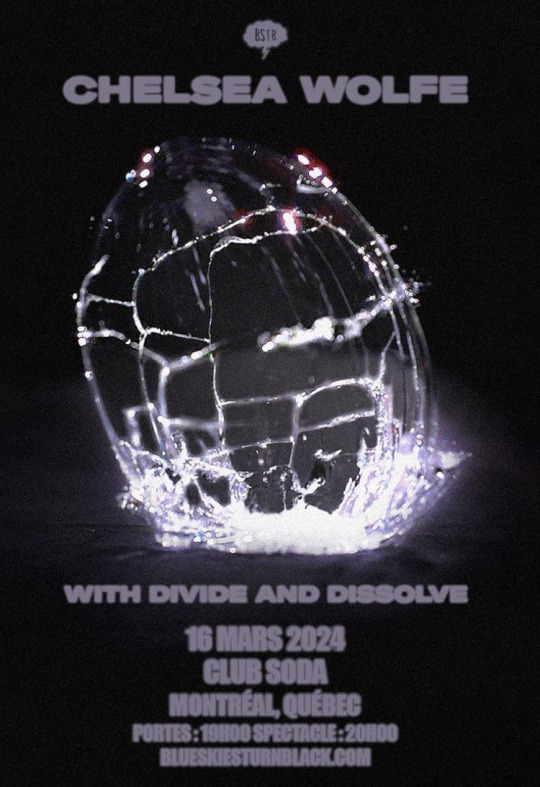
Tonight! So excited to see Chelsea Wolfe for the first time!
5 notes
·
View notes
Text
Divide And Dissolve, "Far From Ideal - Chelsea Wolfe Remix" #NowPlaying
3 notes
·
View notes
Text
Song of the Day
#doom metal#sludge metal#doom#sludge#metal#divide // dissolve#divide and dissolve#Spotify#song of the day#playlist
3 notes
·
View notes
Text





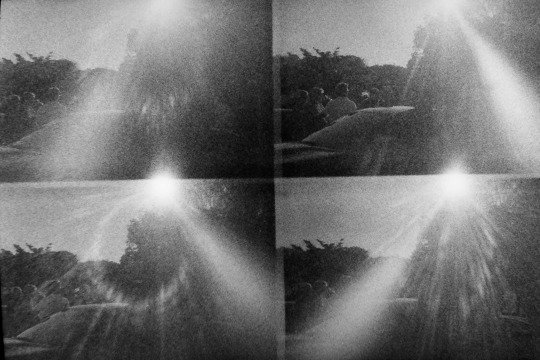
0 notes
Text
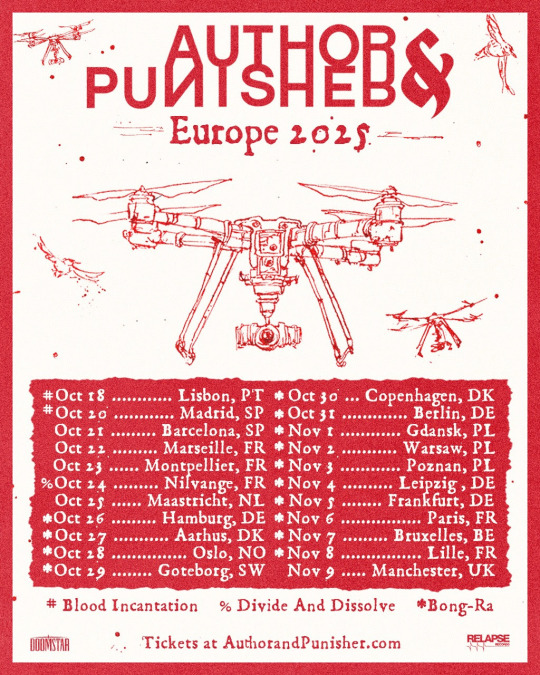
Author & Punisher will be touring Europe and the UK in October and November, with Blood Incantation, Bong-Ra, + Divide And Dissolve. Ticket information can be found here.
0 notes
Text
3691: "Insatiable" by - Divide and Dissolve
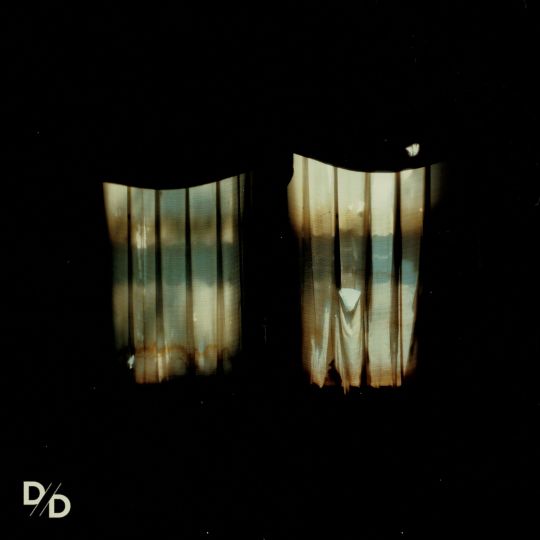
#Music#Luke's Album A Whenever He Feels Like It#Divide and Dissolve#Divide//Dissolve#Insatiable#2025#Doom#Drone#Heavy#Metal#Neo Classical#Melbourne#Australia#Australian#Bella Union
1 note
·
View note
Text

Omega Radio for March 14, 2020; #222.
Harvey Pekar “Tittering Smoke”
Prayer Group “Code Black”
Sunstroke “Revival”
Great Falls “Kettle Logic”
Agenda “Life Left Behind”
Cancer Bats “Inside Out”
Help “The Devil Is A Snake”
Verdun “L’Enfant Nouveau”
American Nightmare “Life Support”
Buildings “Sit With It”
Horsewhip “Fires”
Exhalants “False (St)art”
Remote Viewing “Whitney Houston, We Have A Problem”
Divide And Dissolve “Prove it”
Human Impact “November’
Big Business “Heal The Weak”
Keelhaul “39F”
Pigs Pigs Pigs Pigs Pigs Pigs Pigs “Reducer”
Anywhere But Home “We Should’ve Stayed Strangers”
Drug Church “Blissed Out”
Less Art “Mood 7 Mind Destroyer: Guilt”
The Body “Myth Arc”
Pinko ‘Spit On The House”
Faking “Less & Less”
(J.J. Paradise) Players Club “The E.M.P.”
The Hope Conspiracy “They Know Not”
Caspain “Vision Blues”
All twos. Noise rock, doom, sludge, stoner, and metalcore volume.
#omega#music#playlists#mixtapes#noise rock#garage#psych#Harvey Pekar#American Nightmare#Buildings#Horsewhip#Remote Viewing#Divide And Dissolve#Human Impact#Big Business#Keelhaul#Drug Church#The Body#(J.J. Paradise) Players Club#Hope Conspiracy
5 notes
·
View notes
Text
Ehi man, slow down cantava il buon Thom una trentina di anni fa... [al link 👇🏼] #laxxvora #releaseday #gennaio2025 #newmusic #newmusicfriday
#2025#Adrian Younge#Batpiss#Beirut#Divide and Dissolve#Julien Baker#Mamuthones#Melvins#MIEN#Music#Musica#NewMusicFriday#Release Day#The convenience#Torres#Tunde Adebimpe
0 notes
Text
Divide and Dissolve Interview: Healing from Generational Wounds
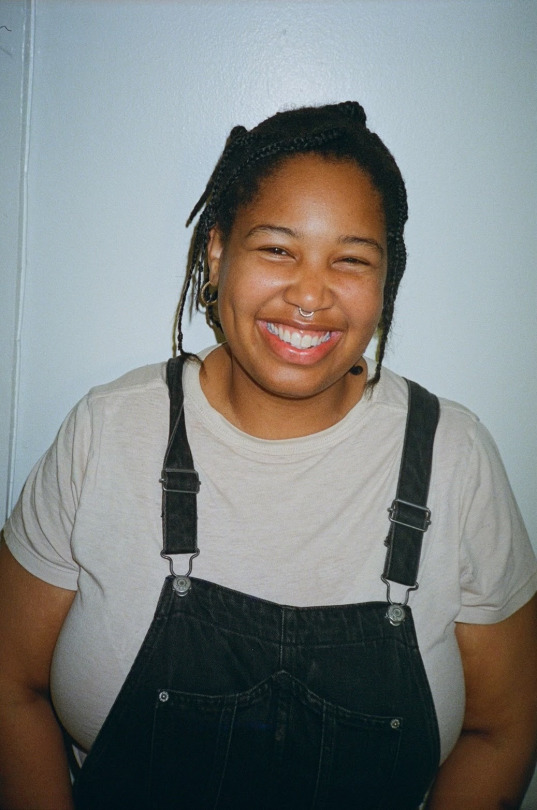
Photo by Brandon McClain
BY JORDAN MAINZER
"I don't know what I'm supposed to do / I'm so lonely without you," Takiaya Reed sings towards the end of Insatiable, her latest Divide and Dissolve album out tomorrow via Bella Union. On paper, the line seems confessional and vulnerable, though nothing out of the ordinary in context of the history of popular music, let alone of the current era of diaristic singer-songwriters. Consider, however, that these words are the first ever uttered on a Divide and Dissolve record. The project, which started as a duo but has consisted solely of Reed since 2022, uses a mixture of abstract and concrete instrumentation--distorted guitar, thwacking snares, expressive saxophone--to create songs that confront sociohistorical ills and address trauma. Reed, who is Black and Cherokee, views Divide and Dissolve's music as a form of anti-oppression activism. What makes Insatiable unique is that for every song that decries white supremacy, colonialism, and racism, there's one that imagines and ultimately celebrates hegemony's eventual demise.
The variance in tone on Insatiable also results in an album with a rich sonic palate and adventurous arrangements. Opening track "Hegemonic" features operatic vocals and sound engineer Nicholas Wilbur's pulsating synth drum. "Monolithic" pairs Reed's trademark guitar barrage with a winding saxophone line and mammoth drums from Seth Cher. "Loneliness" and "Grief" are comparatively soft, the former sporting arpeggiated, fluttering saxophone that sounds mournful. "Provenance" begins with high-pitched saxophone and string-like guitars, forewarning Cher's explosive, driving drum beat. And "Disintegrate" offers the greatest contrast within one song, as Reed's guitars churn like a machine, only to be led by Cher's drums into an extensive shimmer.
That many of the songs on Insatiable, and the record as a whole, finish on a positive note, is significant. Reed may be more up front than ever singing about loneliness, but it's the album closer "Death Cult" that leaves the most lasting impression. With the song, Reed wanted to reject the idea that for the marginalized, state-sanctioned death is inevitable. Its layers are sneaky, its saxophones shrill, its temper guarded, yet confident, a blueprint for existing in the world.
Two months ago, Reed spoke with me over the phone from New Orleans about Insatiable, the power and physicality of non-verbal music, playing live, and what insatiability means to her. Read our conversation below, edited for length and clarity.

Insatiable album cover
Since I Left You: Insatiable is the first record you sang on. Is there anything else about it you think is unique as compared to your discography so far?
Takiaya Reed: It feels like a really special record. I'm really excited about it. It's hard to distinguish it with words. It's more of a feeling. I felt really free when making it. It felt important for me to use my voice in this particular way.
SILY: On the very first track, "Hegemonic", the vocals are low in the mix, but very operatic. They sound to the listener like they're coming from a different world. You're easing the listener into this new part of your sound.
TR: Yeah. Totally. I really like that song as well.
SILY: You've spoken about Divide and Dissolve in general in context of the power of nonverbal music and communication, especially when it comes to communicating an idea that's anti-colonial or anti-oppression, resisting of hegemonic powers. It reminds me a lot of listening to music in a language I don't speak, where the songs are anti-colonial, and I wouldn't know it from the lyrics, but I can kind of feel the idea of struggle coming through. Is that something you identify with, whether in terms of instrumental music or music in a language you don't know?
TR: Yeah, I feel a deep resonance with what you're saying. Music is so powerful, and you don't need to do anything in order to enjoy it or appreciate it or be moved by it or be encompassed in its power. That's something I really appreciate about music. It feels so accessible. Even if your ears can't hear, your body can feel. There are so many different ways to be around and ingratiated in music. There are all these tones and frequencies that impact our lives that we can't even hear with our ears but are interacting with our bodies. They make things more pleasurable for us. I have an appreciation of music and what it does for our souls.
SILY: I've never seen Divide and Dissolve live, but given the type of music you play, I imagine there's lots of distortion and heaviness, to the point where you can physically feel it. How important is that to you?
TR: It's of the utmost importance. I have been so profoundly committed to this in a way that is kind of ridiculous. [laughs] I carry around so much more gear than most people I know so that people can feel the music in the capacity rooms I'm playing. It's one of the most important elements of music. I think it changes the dynamic and the tone in which we all gather together, in a way that's very confrontational and ultimately super positive. It helps me be more optimistic about me playing and hopefully people's experience of the music.
SILY: I interviewed Katherine Paul from Black Belt Eagle Scout a couple years ago at Pitchfork Music Festival. Theirs was another set where I could feel the sheer force of the guitar and amplifiers, even though it was outside. I know you and KP have collaborated; do you find kinship with her because of your views on the physical ability to change a body through music?
TR: I think KP's music is so gorgeous. It feels so deep. There's so many ways to feel connected to that music. What she is putting out there into the world, I feel deep resonance with it. There are these moments where you're like, "Oh, wow, we're all very connected." You can feel what KP is putting out there. It's very important. I'm so grateful KP that makes music and that I was able to [co-]produce her [most recent] album.
SILY: I know you had worked with Nicholas Wilbur before, but had you worked before with anyone else on Insatiable?
TR: I never had. I think Nicholas Wilbur is the best sound engineer I've ever met in my life. I love working with him. I work with him on as many things as I can possibly work with him on. He's very busy, but I'm grateful that he continues to make time for me. I called him and told him, "Hey, let's record this next one in the UK." I just wanted to go to a different spot. His studio is incredible. It's one of the best studios you can record in. I wanted to have the experience of being in a different place and environment. I was able to draw from so many different other perspectives.
SILY: Had you written the material before recording? How much was fleshed out in the studio?
TR: That's funny. I wrote this whole entire album in Germany and was like, "Great, Nick, I wrote a new album in Germany. Let's go record it." I got into the studio and just started writing [something else]. I wrote the whole [Insatiable] album in the studio. So I still have a brand new album that has not been recorded.
SILY: Can you pinpoint what inspired you to start fresh?
TR: No, it just happened. I was just sitting there playing my saxophone. Nick decided to rent a car, and he was like, "Let's go to Sandwich..." We were going to visit weird castles in Sandwich, and I said [when we start recording,] "I want to start with saxophone." I guess what happened is we started recording sax first, and I was like, "Oh, god, I want to do something so different from what we planned on doing." Then we started doing the guitar, and I [thought the same thing.] Everything was just made in the studio.
SILY: More than on any of your other records, the instruments on Insatiable take the appearance of other types of instruments. I'm not sure whether that happens through processing, but there are times when the guitars sound like strings. Was that something you had always wanted to do, to experiment like that? Or was that spontaneous in the studio?
TR: I always enjoy the confusion. I love sonic confusion. There are so many elements of life that are non-linear, and music is one of them. People say that saxophone is one of the closest instruments to the voice. When people hear a saxophone, they sometimes think it's a voice, trumpet, clarinet, or strings. For me, I don't try really hard to distinguish the instruments. It's not of great importance to me that a guitar sounds like what people think a guitar sounds like, or a saxophone sounds like what a saxophone is supposed to sound like. That's something I will always be in appreciation of.
SILY: The first few songs on Insatiable segue into one another, and as soon as "Loneliness" hits, you can tell it's so much different than the beginning of the album, and "Dichotomy" is a jarring transition from loneliness. Is that another thing you consciously do: Lull the listener and then confront them with a totally different sound?
TR: I feel like I was just trying to talk about something. I've lost so many friends recently, and some of them were really lonely, and that's why they decided they couldn't live anymore. There's so much weird grief that's around, and it sometimes makes sense and sometimes doesn't. I was just having emotions about all of it. I was just trying to have a conversation and express some things that I was feeling.
SILY: When you play songs like "Loneliness" live, songs where when you wrote them, you were processing grief, do you enter that same headspace as when you wrote it, when presenting it to a room of people?
TR: For me, when I'm presenting these songs, I'm hoping things can feel better for everyone. It's more of a continuation. This thing that happened is really bad, and we're still here giving it a go. We're still trying really hard to have a good life and feel good and move with love. For me, that's a vibe. It's refusing to give up. That's something I'm really into. I love it when my friends feel better. Bad things happen, when you're presented with systemic and colonial grief, being able to move forward in love and life is an accomplishment. I feel really grateful and excited at that prospect.
SILY: I feel like the album title totally turns the connotation or idea of "insatiable" or insatiability, on its head. You read that word, especially when it comes to heavier music, and you think of something primal, like an insatiable appetite. Something raw. It seems to me that the album is more about an insatiable appetite for love and positivity. Is that the connotation you most identify with?
TR: Absolutely. Insatiable love, insatiable hope, insatiable strength. Being able to be strong. Being able to heal from these wounds that were passed down to you. Not even things that you experienced in your body, but from many generations ago. Being able to change that narrative.
SILY: Have you played these songs live?
TR: I've played a couple of them live. I'm really excited to translate them.
SILY: Is there anything else on the horizon for you in the short or long term?
TR: I just made my first symphony. It was performed in London. I'm looking forward to more scoring opportunities and expressing myself in that way. I had a lot of fun composing my first symphony. I'm excited about symphony number two. I'm not sure when that will happen, but symphony number one just happened.
SILY: Is there anything you've been listening to, watching, or reading that has inspired you or caught your attention?
TR: The last book I just read, called Naked Portrait by Rose Boyt, was incredible. I love that book a lot. It was more of a memoir. Her father was Lucian Freud. She just talked about her life and experiences. I was so moved by the book.
youtube
#divide and dissolve#interviews#insatiable#brandon mcclain#takiaya reed#bella union#nicholas wilbur#seth cher#katherine paul#black belt eagle scout#pitchfork music festival#naked portrait#rose boyt#lucian freud
1 note
·
View note
Text
Divide and Dissolve ~ Insatiable
As the system’s parts plug into each other to grind our senses into shapes unrecognizable to ourselves, we are produced and reproduced to mimic its never-ending impulses. Doom metal has always been about the world’s end, the concrete burden of unraveling ourselves unto the slow tragedy of building nothingness. The weight of its volume is undeniable, and yet in this generalized oppression there is…
1 note
·
View note
Text
Divide and Dissolve announce Insatiable on Bella Union for April 2025
Bella Union schedules Insatiable by Divide and Dissolve for release The new album by Divide and Dissolve, titled Insatiable, is scheduled for release on 18 April 2025 via Bella Union. The project consists of ten instrumental tracks centered on themes expressed through repetition, emotional intensity, and sonic density. The album includes the track “Monolithic,” which introduces saxophone…
#April 2025#Bella Union#Divide and Dissolve#Doom Metal#experimental#instrumental#new releases 2025#saxophone#Takiaya Reed
0 notes